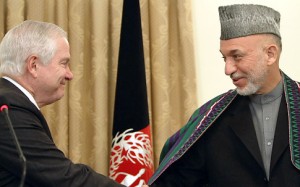Sunday
Sep052010
Afghanistan: New US Line "Maybe Some Corruption Isn't Bad" (Jaffe)
 Sunday, September 5, 2010 at 8:39
Sunday, September 5, 2010 at 8:39  We have been noting the tension --- indeed one might call it a battle --- between US officials and Afghanistan President Hamid Karzai over the political and legal approach to corruption.
We have been noting the tension --- indeed one might call it a battle --- between US officials and Afghanistan President Hamid Karzai over the political and legal approach to corruption. Writing in The Washington Post, Greg Jaffe reports on an apparent "resolution". Perhaps the sharpest observation on the outcome comes from Marc Lynch, who sets out the American five-step programme for recovery: "1. There's no corruption; 2. International conference to solve it; 3. Military surge will stop it; 4. Maybe it's not so bad; 5. It's key to success."
It should also be noted that this development occurs amidst news that the US and Afghan Governments are discussing how to bail out Afghanistan's biggest bank, the Bank of Kabul, which is reportedly on the verge of collapse:
Afghanistan: Hearts and Minds v. Blood and Anger (Mull)
U.S. military commanders in Afghanistan are developing a strategy that would tolerate some corruption in the country but target the most corrosive abuses by more tightly regulating U.S. contracting procedures, according to senior defense officials.
American officials here have not spoken publicly about countenancing potentially corrupt local power brokers. Such a stance would run somewhat against the grain of a counterinsurgency doctrine that preaches the importance of building competent governance.
But military officials have concluded that the Taliban insurgency is the most pressing threat to stability in Afghanistan and that a sweeping effort to drive out corruption would create chaos and a governance vacuum that the Taliban could exploit.
"There are areas where you need strong leadership, and some of those leaders are not entirely pure," said a senior defense official. "But they can help us be more effective in going after the primary threat, which is the Taliban."
The issue of corruption in Afghanistan has taken on renewed urgency in recent weeks with the arrest of a senior aide to President Hamid Karzai and new questions about Kabul's commitment to fighting graft. Senior Obama administration officials have repeatedly emphasized the need to root out graft in Afghanistan and have deployed teams of FBI and Drug Enforcement Administration agents to assemble corruption cases. The United States has spent about $50 billion to promote reconstruction in Afghanistan since 2001.
It was not immediately clear whether the White House, the State Department and law enforcement agencies share the military's views, which come at a critical time for U.S. forces in Afghanistan. After an eight-month buildup, the 30,000 additional soldiers and Marines that President Obama ordered to this country are almost entirely in place, allowing U.S. and Afghan forces to conduct sweeps of Taliban strongholds and detain insurgents leaders at the highest levels of the nine-year war, military officials said.
Defense Secretary Robert M. Gates visited two U.S. Army units on Friday that had been hit with tough losses in recent days as they cleared insurgents from areas in and around Kandahar, the spiritual home of the Taliban and the site of some of the heaviest fighting for U.S. and Afghan forces.
"It has been a tough week for you," Gates told soldiers from an Army battalion that had lost seven soldiers earlier in the week. "Unfortunately, there are going to be more tough weeks ahead."
The Kandahar campaign reflects the broad nature of the problems that the United States faces throughout Afghanistan and explains why some U.S. officials are reluctant to take too hard a line on Afghan corruption. "Kandahar is not just a Taliban problem; it is a mafia, criminal syndicate problem," the senior defense official said, speaking on condition of anonymity because of the sensitivity of the subject. "That is why it is so complicated. But clearly the most pressing threat is the Taliban."
Read full article....
tagged  Greg Jaffe,
Greg Jaffe,  Hamid Karzai,
Hamid Karzai,  Robert Gates,
Robert Gates,  Taliban,
Taliban,  Washington Post in
Washington Post in  Afghanistan
Afghanistan
 Greg Jaffe,
Greg Jaffe,  Hamid Karzai,
Hamid Karzai,  Robert Gates,
Robert Gates,  Taliban,
Taliban,  Washington Post in
Washington Post in  Afghanistan
Afghanistan 